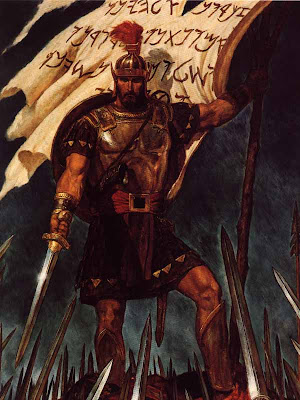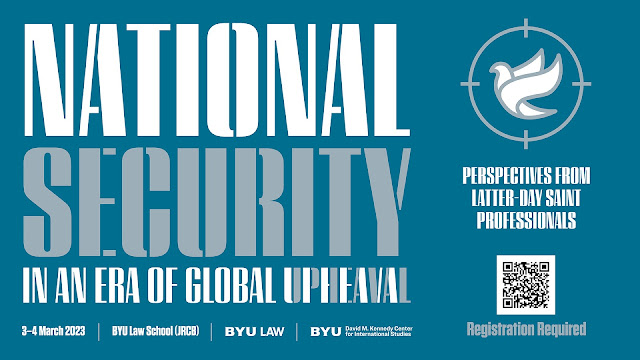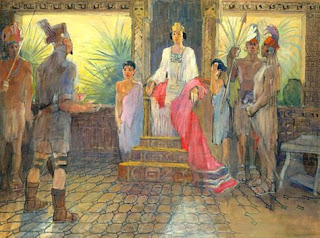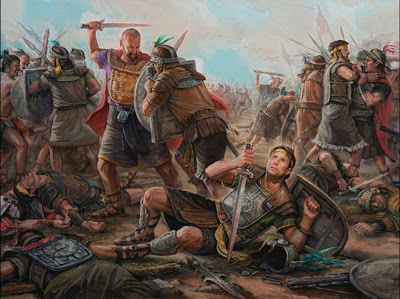You’re watching the news of something awful. The world trade
towers collapsed, Israel suffered the worst holocaust since World War II, and
through your tears you think of what you should say and do next. What
scriptures came to your mind?
Latter-day Saint discourse on war gravitates toward a small
set of proof texts which mirror the broader Christian tradition. From the Sermon on the Mount, we read Christ’s injunction
to “turn the other cheek” (Matt. 5:39). From modern revelation, we repeat the
Lord’s command to “renounce war and proclaim peace” (D&C 98:16). These two
generally drive what seems like an obvious command towards LDS pacifism and
nonviolence. From Captain Moroni’s leadership we recall the charge that “ye
shall defend your families even unto bloodshed” (Alma 43:47). And we are told that we can't let our wives and children be massacred (Alma 48:24). This drives what
seems like an obvious command towards the use of force.
Even though they are used as such, scriptures are rarely intended to function as a set of disconnected
slogans. Each verse gains meaning and moves from proof text to proof in
conversation with the others, and the interpretive challenge lies precisely in
holding them together.
The analytical key to resolving this tension lies in the
just war tradition. First articulated thousands of years ago and refined over
the years, the parable of the Good Samaritan provides a simple but commanding answer. As described by Jesus
(Luke 10:25-37) as the epitome of Christ like love, the Samaritan's first impulse, even to those that were his ethnic rivals
and looked down upon him, was to heal. After being set upon by bandits, the Good Samaritan gave the beaten traveler oil and
wine, and provided for the injured man’s recovery. He did not act from
vengeance or national loyalty, but from compassion across ethnic and religious
boundaries. As described in chapter one of my book, To
Stop a Slaughter: Just War in the Book of Mormon, this, is the peaceful
heart we should cultivate.[1]
Yet there is a narrative gap in the parable. The bandits
vanish offstage after committing their crime. But what if the Samaritan
happened upon the beaten traveler amid the attack, or what if they had returned
while the Samaritan was binding wounds?[2] To use a modern phrase, what if this was a dangerous neighborhood and the threat was ongoing? Would compassion mean turning the other cheek through silence and inaction? Would the Samaritan offer peaceful, conciliatory words as the traveler is attacked? Or would love compel
him to stand between the victim and his assailants?
This simple, logical, profound, and commanding answer is
that the Good Samaritan would feel morally compelled, out of love for his
neighbor, to intervene. This is precisely the spirit that Alma attributes to
the Nephites under Captain Moroni:
They were compelled reluctantly to contend with their brethren, yea, and were brought to the sword in defense of their lives. … They were sorry to take up arms against the Lamanites, because they did not delight in the shedding of blood…Nevertheless, they could not suffer to lay down their lives, that their wives and their children should be massacred by the barbarous cruelty of those who were once their brethren, (Alma 48:21–24).
Here we see verses that refute a simple slogan. We are commanded to renounce war, to seek peace, and to
cultivate the Samaritan’s compassion. Yet we are also commanded to defend our
families, our faith, and the vulnerable. We are commanded to avoid what Thomas Aquinas called an “evil
peace” that stands idly by while others are slaughtered.[3]
What emerges from reading all the scriptures, instead of embracing some and
minimizing or ignoring others is what Just War theorists from Augustine onward
have called the tragic necessity of defense: war may be waged, but only
with reluctance, never delight.³
LDS scripture does not hand us bumper stickers, as much as
we might hear those slogans in online discourse. Instead, we are handed
something far more complex, but understandable and enriching. When you see
disturbing news, and have a gut instinct about what to say and do, hopefully that gut is something that embraces an ethic from strong and interlocking ideas, and not limiting proof texts. We must
renounce war and proclaim peace, cultivate a peaceful attitude that turns the
other cheek, but love our neighbor enough to intervene against robbers, and
defend them unto bloodshed.
If you found value in this work please consider donating using the paypal button below or by purchasing one of my books linked within this piece or in the top left. Thanks for reading!
************
[1]
Also see Morgan Deane, “Greater Portion of the Word: The Decisive Book of
Mormon in the Debates on War and Peace,” in Defending the Book of Mormon:
Proceedings of the 2023 FAIR Virtual Conference, Scott Gordon, Trevor
Holyoak, Jared Riddick, (FAIR Press, 2025), 117-127.
[2] Paul
Ramsey, The Just War: Force and Political Responsibility, (New
York: Rowan and Littlefield Publishers, 2002), (New York: Scribner, 1968),143.
[3] Thomas
Aquinas, Summa Theologica, 40, article two, answer to objection 4. https://www.newadvent.org/summa/3040.htm
(Accessed September 2nd, 2025.)






_MET_DP835845.jpg)









